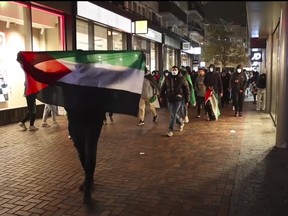It was an act of calculated barbarism

Article content
“I’m not Jewish!” cried one man as he was beaten by a mob. Others were forced to prove this by presenting their passports. One man jumped into a canal to escape his tormentors. Still others were attacked with fireworks, punched in the head, and, in one case, kicked repeatedly while unconscious on the ground.
This could be mistaken for a scene from one of the many antisemitic purges Europe has witnessed in past centuries. But it happened in Amsterdam on Thursday night, when Israeli football fans were hunted down in a coordinated act of violence.
Advertisement 2
Article content
Amsterdam is known for its liberal mores and charming canals lined by tilted old buildings. An unlikely destination, in other words, for a word seldom uttered in post-war Europe: “pogrom.” But this is how the rampage has been described by Israel’s president, Isaac Herzog, who was joined in his condemnation by politicians from around Europe.
Some media outlets, however, have framed the violence as more of a “clash” between rival football thugs—sparked by Israeli fans chanting anti-Arab profanities and tearing down a Palestinian flag.
Admittedly, the Maccabi Tel Aviv fans, who refer to themselves as “super Jews”, were at times chauvinistic and loutish in the build-up to their game against Ajax; reportedly harassing locals, bellowing “f*** you Palestine”. And this may have grated some of Amsterdam’s large Arab-Muslim population.
But what followed transcended the bounds of uncouth football rivalry: it was an act of calculated barbarism, organized over WhatsApp and Telegram. “Tomorrow after the game, at night, part 2 of the Jew Hunt,” one message read. This was not idle talk. Legions of antisemitic ghouls, some carrying knives, prowled around the Dutch capital in search of targets.
Article content
Advertisement 3
Article content
A short drive from the Anne Frank House, Jews were hounded, beaten and humiliated for one reason only: because they are Jews. Those targeted may have had no association with the Maccabi troublemakers. This mattered little to their attackers, to whom they pleaded for mercy, appealing in vain to a humanity and reason that simply weren’t there.
Predictably, some pundits were quick to attempt to justify the unjustifiable. I suspect this is in part because the villains of this story — who are modern-day Brownshirts — consist largely of Dutch-Arabs. Some donned keffiyeh scarves, others wailed “free Palestine” and “now you know how it feels” as they pummelled Israeli tourists.
This pogrom-in-miniature, rooted in an ethno-religious conflict thousands of miles away, is emblematic of a far larger problem in Europe. For years, Holland and other European countries have invited vast numbers of people whose values and culture are often at odds with their own.
This was a bold experiment made to appear less hazardous through rose-tinted spectacles. Europeans thought vainly that because we had largely set aside ethno-sectarian politics after the atrocities of the 20th century that others would do the same once they arrived. But they have not. Instead, many newcomers have brought their cultural and political allegiances with them — often responding to events in the Middle East with violence in Europe. To make matters worse, the problem tends to compound as later generations can display more cultural separatism than their forebears.
Advertisement 4
Article content
As a result, our societies have gradually splintered into fragile, Lebanon-like entities, where sectarian divides often eclipse any sense of cohesive national identity. Some of the consequences of this were made apparent on Thursday night.
Perhaps the most unsettling part of this self-described “Jew hunt,” which left five people hospitalized, was the paltry response of the Dutch police. Reports suggest officers failed to act swiftly and, in some cases, to act at all. “I and two others ran to the nearest police station, but they didn’t open the door,” one of the victims claimed.
One hopes there is a reasonable explanation for this. Yet Amsterdam’s police force — with its increasingly diverse make-up — may have had other reasons for their reluctance to intervene. Last month, the Dutch Jewish Police Network warned that some officers “no longer want to protect Jewish targets or events,” vaguely citing “moral dilemmas.”
Ethnic fault lines in policing aren’t unique to the Netherlands; a similar trend can be seen in Britain, where the Metropolitan Police sometimes deploys ethnic associations to manage crime in their own communities — in effect, allowing certain ethnic groups to police themselves.
Advertisement 5
Article content
The erosion of impartial law enforcement is one of the many unintended consequences of Europe’s experiment with mass migration and multiculturalism — outcomes which politicians have, for decades, either failed to foresee or chosen to overlook.
The events of Thursday night highlight a painful truth: Europe’s experiment with mass migration has left Jews increasingly vulnerable. Antisemitism has risen as the continent has absorbed more people from regions where this prejudice is endemic, particularly in parts of the Islamic world. In France, for example, “nearly all” violent antisemitic acts have been linked to individuals with a Muslim background, according to sources cited by the Times of Israel.
The consequences of this rising antisemitism are stark: Jews are leaving Europe. Over the past 50 years, Europe’s Jewish population has halved—from 3.2 million in 1970 to 1.3 million in 2020. During the same period, Europe’s Muslim population has doubled, now totalling more than 26 million people.
The scenes in Amsterdam — reminiscent of Europe’s darkest hours — will likely accelerate this trend, as more Jewish Europeans are made to feel unsafe. Ironically, they also serve as a stark reminder of the enduring need for the state of Israel.
Article content


Comments